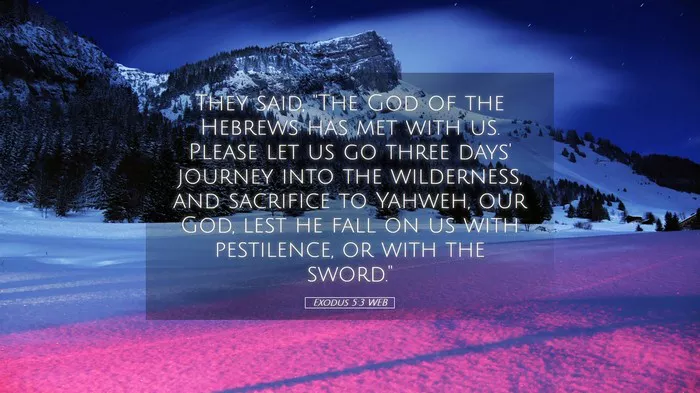Read the Daily Bible Verse – Exodus 5:3 To Strengthen Your Spiritual Journey.
Exodus 5:3 marks a crucial moment in the conversation between Moses, Aaron, and Pharaoh during their initial request for the release of the Israelites. This verse provides further insight into the Israelites’ plight and the divine purpose behind their freedom.
This article explores the verse in its historical, theological, and practical dimensions, examining its significance and application for believers today.
The Context of Exodus 5:3 KJV
Historical Background
Exodus 5:3 states:
“And they said, The God of the Hebrews hath met with us: let us go, we pray thee, three days’ journey into the desert, and sacrifice unto the Lord our God; lest he fall upon us with pestilence, or with the sword.”
In this context, Moses and Aaron have been commissioned by God to deliver His message to Pharaoh, demanding the release of the Israelites so they may worship God in the wilderness (Exodus 3:18). Their request emphasizes obedience to Yahweh, the God of the Hebrews, distinguishing Him from the Egyptian gods Pharaoh revered.
The plea also reflects the Israelites’ urgent need to worship and acknowledge God without interference, emphasizing the spiritual significance of their liberation.
Pharaoh’s Opposition
This verse follows Pharaoh’s dismissive response to Moses and Aaron’s first request (Exodus 5:2), where he questions, “Who is the Lord, that I should obey his voice?” Pharaoh’s defiance sets the tone for the ensuing conflict between divine authority and human pride.
The Meaning of Exodus 5:3
Acknowledging God’s Sovereignty
Moses and Aaron’s declaration underscores God’s sovereignty and His direct involvement with His people. By stating that “The God of the Hebrews hath met with us,” they affirm that their mission is divinely ordained and non-negotiable.
The Call to Worship
The request to go three days into the wilderness to sacrifice reflects the centrality of worship in the Israelites’ relationship with God. Worship, in this context, is an act of obedience and recognition of God’s holiness.
A Warning of Judgment
The warning about God falling upon them with pestilence or the sword highlights the seriousness of disobedience. It reflects an understanding that neglecting God’s commands has severe consequences, not only for Pharaoh but also for the Israelites themselves.
Exodus 5:3 Application in Life
Obedience to God’s Commands
This verse serves as a reminder of the importance of obedience in the Christian life. Just as the Israelites were called to respond to God’s command with faith and action, believers today are called to prioritize His will above all else.
The Priority of Worship
The Israelites’ request to worship underscores the significance of setting aside time to honor and acknowledge God. Modern believers are similarly called to make worship a central aspect of their lives, recognizing it as a vital expression of faith.
Trusting God’s Purpose
Moses and Aaron’s boldness in delivering God’s message demonstrates trust in His plan, even in the face of opposition. Christians are encouraged to trust in God’s sovereignty and remain faithful to His calling, regardless of external challenges.
Comparison with Other Biblical Texts
Jonah 3:4: The Warning of Judgment
Jonah 3:4 records Jonah’s warning to Nineveh:
“Yet forty days, and Nineveh shall be overthrown.”
Both passages highlight God’s willingness to warn before executing judgment, emphasizing His mercy and desire for repentance.
Acts 5:29: Obeying God Rather Than Men
Acts 5:29 states:
“We ought to obey God rather than men.”
Moses and Aaron’s insistence on delivering God’s message parallels the apostles’ commitment to prioritizing obedience to God over human authority.
Hebrews 12:28-29: The Call to Worship
Hebrews 12:28-29 reminds believers:
“Let us have grace, whereby we may serve God acceptably with reverence and godly fear: For our God is a consuming fire.”
This echoes the seriousness of worship emphasized in Exodus 5:3, where neglecting God’s commands has dire consequences.
Modern-Day Relevance
The Call to Stand Firm
Moses and Aaron’s courage in delivering God’s message to Pharaoh serves as an example for believers facing opposition today. Whether in the workplace, community, or personal relationships, Christians are called to stand firm in their faith and convictions.
The Urgency of Worship
The Israelites’ request underscores the importance of prioritizing worship in the midst of life’s demands. Modern believers must likewise carve out time to connect with God, recognizing worship as both a privilege and a responsibility.
The Consequences of Disobedience
The warning in Exodus 5:3 serves as a sobering reminder of the consequences of neglecting God’s commands. It calls believers to examine their lives, ensuring that they are walking in obedience and reverence before God.
Conclusion
Exodus 5:3 is a profound verse that captures the essence of the Israelites’ plight and God’s purpose for their liberation. It emphasizes the importance of obedience, worship, and trust in God’s sovereignty, offering timeless lessons for believers today.
As Christians reflect on this passage, they are reminded of their own calling to prioritize worship, stand firm in their faith, and trust in God’s ability to accomplish His will. Exodus 5:3 challenges believers to live lives of obedience and reverence, recognizing that God’s plans are always for their ultimate good and His glory.
May this verse inspire us to trust in God’s faithfulness, prioritize worship, and remain steadfast in our commitment to His calling.
Exodus 5:3 Commentary
Theological Significance
Exodus 5:3 highlights the tension between God’s sovereignty and human resistance. Pharaoh’s opposition symbolizes the broader spiritual battle between the forces of good and evil, with God’s power ultimately triumphing.
Practical Implications
For the Israelites, this verse reflects their desperate need for liberation, not only from physical bondage but also from spiritual neglect. It underscores the importance of worship as a central aspect of their identity as God’s people.
A Message of Hope
While Pharaoh’s initial response is one of defiance, the events that follow demonstrate God’s faithfulness in delivering His people. This verse serves as a reminder of God’s ability to fulfill His promises, even in the face of seemingly insurmountable obstacles.
You Might Be Interested In:

